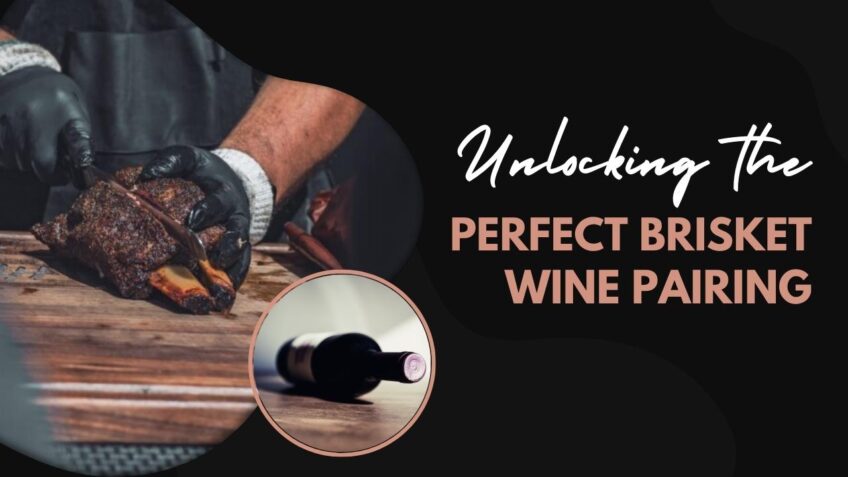Brisket, a flavorful and tender cut of beef, is a favorite at barbecues, family gatherings, and festive occasions. It’s no secret that the right wine can elevate a meal, and pairing wine with brisket is no exception. A harmonious blend of flavors can make each bite even more delicious, while an off-kilter pairing can hinder the dining experience.
In this article, we will explore the art of brisket wine pairing, discussing the various factors that influence this culinary marriage and providing helpful tips for choosing the perfect wine to accompany your brisket dish. By understanding the nuances of wine and brisket pairing, you can impress your guests, enhance the flavors of your meal, and create an unforgettable dining experience.
Overview
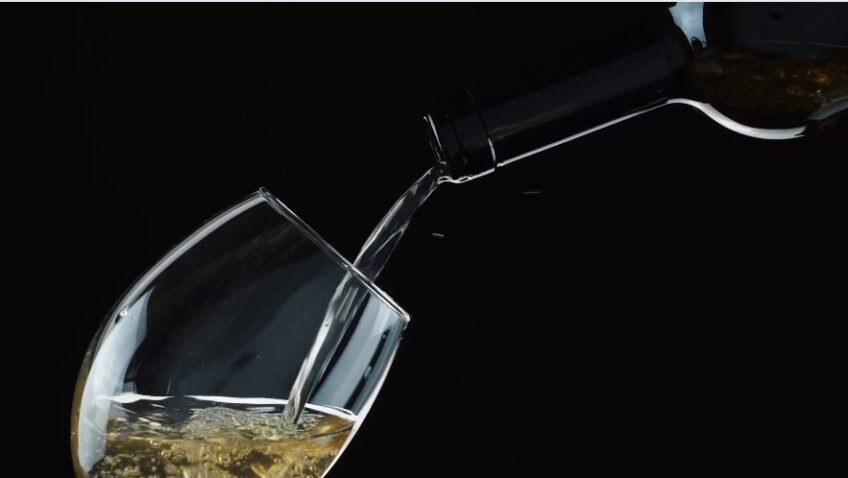
Brisket comes from the breast section of the cow and is typically divided into two cuts: the flat cut and the point cut. The flat cut, also known as the first cut, is leaner and has a more uniform shape, while the point cut, or the second cut, is thicker and has more marbling. The type of brisket you choose can influence the flavor profile and thus impact the wine pairing.
There are also various ways to prepare brisket, from smoking to braising, which can yield different flavors and textures. For example, smoked brisket often has a rich, smoky flavor with a slightly crispy exterior, while braised brisket tends to be more tender and moist, with a more subtle flavor. Understanding the nuances of each preparation method will aid you in selecting the ideal wine to complement your brisket.
Key factors
When pairing them, consider the following factors: the type and preparation of the brisket, the wine’s body and structure, its acidity and tannins, and the flavors of any sauces or seasonings used in the dish. These elements will influence the compatibility of the wine and brisket, either complementing or clashing with one another.
For instance, a full-bodied type may overpower a lightly seasoned, braised brisket, while a lighter-bodied type may be overwhelmed by the robust flavors of a smoked or heavily sauced brisket. Additionally, ones with high acidity or tannin levels can help cut through the richness of the brisket, creating a pleasant contrast and balance on the palate.
Cooking Methods
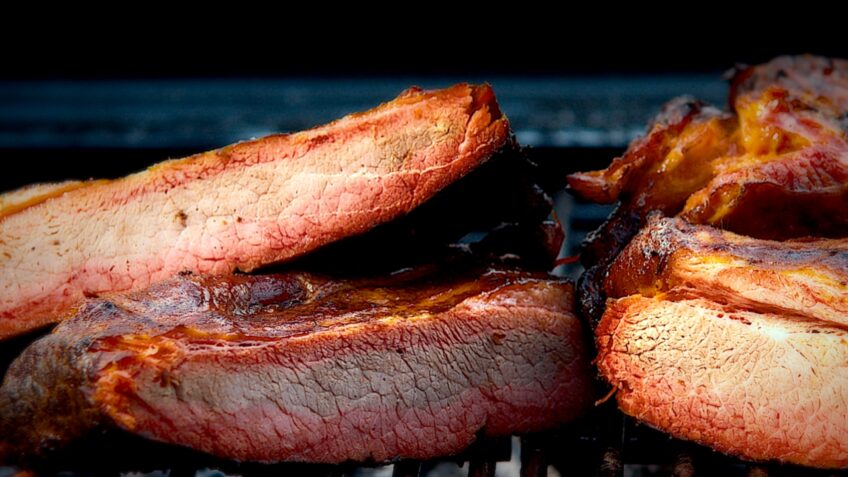
Cooking methods can significantly impact the flavor and texture of brisket, as well as its wine-pairing compatibility. For example, smoking imparts a bold, smoky flavor that pairs well with full-bodied red wines, like Cabernet Sauvignon or Syrah, which can stand up to the robust flavors of the meat.
Conversely, braising or slow-cooking brisket results in a more tender and subtle dish that can be complemented by medium-bodied reds or even certain white wines, like Chardonnay or Chenin Blanc. Understanding the impact of various cooking techniques on brisket will allow you to make informed decisions when selecting the perfect wine pairing.
Popular wine varietals
There are numerous wine varietals that can pair well with brisket, depending on the preparation method and flavor profile of the dish. Some popular options include Cabernet Sauvignon, Syrah, Merlot, and Malbec. These full-bodied reds have the structure and complexity to hold up against the rich flavors of smoked or heavily seasoned meat. Medium-bodied reds like Pinot Noir, Grenache, and Zinfandel can also be a suitable match, particularly for braised or slow-cooked brisket dishes.
For those who prefer white wine, options like Chardonnay, Chenin Blanc, and Viognier can offer a pleasant contrast to the richness of the meat. These whites often possess enough body and flavor intensity to complement the dish without overpowering it. Another alternative is Rosé, which can provide a refreshing balance between red and white wine characteristics, making it a versatile option for various brisket preparations.
Tips for pairing red wines
Consider the intensity of the dish and the wine’s body, acidity, and tannins. A full-bodied Cabernet Sauvignon or Syrah can stand up to the bold flavors of smoked or heavily seasoned meat, with their concentrated fruit flavors, firm tannins, and high acidity providing a pleasant contrast to the richness of the meat. To ensure a harmonious pairing, opt for a wine with enough body and structure to avoid being overwhelmed by the dish.
For braised or slow-cooked brisket, medium-bodied reds like Pinot Noir or Grenache may be more suitable. These typically have softer tannins and moderate acidity, which can complement the subtler flavors and tender texture of the meat. When selecting a type for your meat, consider the wine’s flavor profile, body, and structure in relation to the dish to achieve a balanced and enjoyable pairing.
Tips for pairing white wines

While they are often the go-to choice for pairing with brisket, there are instances where white types can be a delightful match. For example, a rich and full-bodied Chardonnay can complement the flavors of a braised or slow-cooked brisket, with its creamy texture and fruit-forward profile offering a pleasant contrast to the meat. Chenin Blanc, with its moderate acidity and versatile flavor profile, can also be an excellent choice for pairing with brisket, especially if the dish features a tangy or fruity sauce.
When selecting a white wine to pair with brisket, consider the wine’s body, acidity, and flavor profile in relation to the dish. Opt for a white type with enough body and intensity to stand up to the rich flavors of the brisket, while offering a contrasting element to enhance the overall dining experience.
Rosé wine
With their diverse range of flavors and characteristics, can be a versatile and refreshing option for pairing with meat. From crisp and dry to fruity and full-bodied, they can offer a unique middle ground between red and white wines, making them suitable for a variety of brisket preparations. For a smoked or heavily seasoned brisket, consider a full-bodied rosé with enough structure and intensity to hold its own against the robust flavors of the dish.
A lighter, more delicate rosé may be better suited for braised or slow-cooked meat, offering a refreshing contrast to the tender and subtle flavors of the meat. When pairing rosé with brisket, consider the wine’s body, acidity, and flavor profile to ensure a harmonious and enjoyable match.
Acidity and Tannins
They are essential components of wine that can significantly impact the success of their pairing. Acidity in them helps to cleanse the palate and cut through the richness of fatty meats like brisket, providing a refreshing contrast and balance. Ones with higher acidity, such as Cabernet Sauvignon or Chenin Blanc, can be particularly well-suited for pairing with rich, flavorful meat dishes.
Tannins, the naturally occurring compounds found in grape skins, seeds, and stems, can also play a crucial role in wine pairing. Tannins provide structure and astringency to wines and can help to balance the richness of fatty meats like brisket. Full-bodied with firm tannins, like Cabernet Sauvignon or Syrah, can complement the bold flavors of smoked or heavily seasoned brisket, while medium-bodied reds with softer tannins, such as Pinot Noir or Grenache, can be better suited for subtly flavored preparations.
When choosing a type to pair with brisket, consider the acidity and tannin levels in relation to the dish’s flavor profile and richness to achieve a balanced and harmonious pairing.
The impact of sauce and seasoning
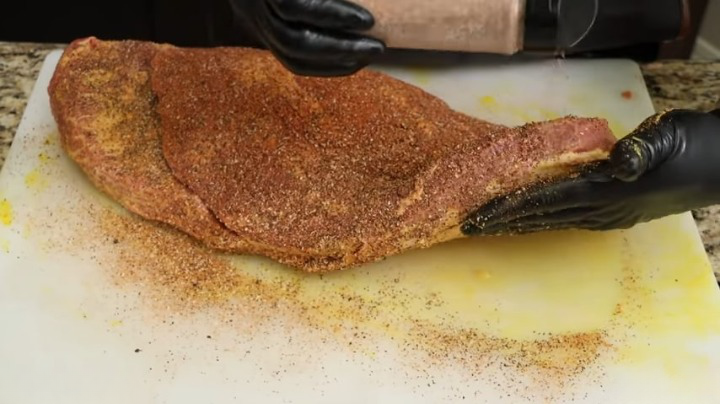
Sauces and seasonings can dramatically impact the flavor profile of brisket and thus influence the wine pairing. Bold, smoky, or spicy sauces and rubs can intensify the flavors of the meat, requiring a wine with enough body, structure, and intensity to stand up to the dish. Full-bodied red wines like Cabernet Sauvignon or Syrah can be ideal for pairing with heavily sauced or seasoned meat, while medium-bodied reds or even some full-bodied whites may be more appropriate for dishes featuring lighter or more delicate sauces.
When selecting a wine to pair with sauced or seasoned brisket, consider the intensity and flavor profile of the sauce or seasoning, as well as the wine’s body, acidity, and tannin levels. Strive for a balanced pairing that complements and enhances the flavors of the dish without overpowering or clashing with the wine.
Pairing with sparkling wines
While still or traditional wines are often the first choice for brisket pairing, sparkling wines, and other alternatives can offer unique and delightful options for complementing your dish. Sparkling types, like Champagne, Prosecco, or Cava, can provide a refreshing contrast to the richness of brisket with their effervescence and bright acidity. These can be particularly well-suited for pairing with lighter, more delicately seasoned dishes.
Beer can also be a suitable alternative to pair a brisket, with options like stout, porter, or IPA offering a range of flavors and intensities to complement various meat preparations. Additionally, non-alcoholic beverages like sparkling water, iced tea, or fruit-infused water can provide refreshing and palate-cleansing options for those who prefer not to consume alcohol.
Tips for serving
To ensure an optimal pairing experience, pay attention to the serving temperature and glassware used for your drink. Red types should typically be served slightly cooler than room temperature, between 60-65°F (16-18°C), while white ones are best enjoyed chilled, around 45-50°F (7-10°C). Serving it at the proper temperature can enhance its flavors and aromatics, making it more enjoyable and better suited for pairing with brisket.
When it comes to glassware, use a larger, more open glass for red wines, like Bordeaux or Burgundy glass, to allow it to aerate and fully express its flavors and aromas. For white wines, a smaller, more tapered glass is suitable, as it helps to concentrate and preserve the delicate aromas and flavors. Proper glassware can enhance the wine’s characteristics and contribute to a more enjoyable brisket and wine pairing experience.
FAQs
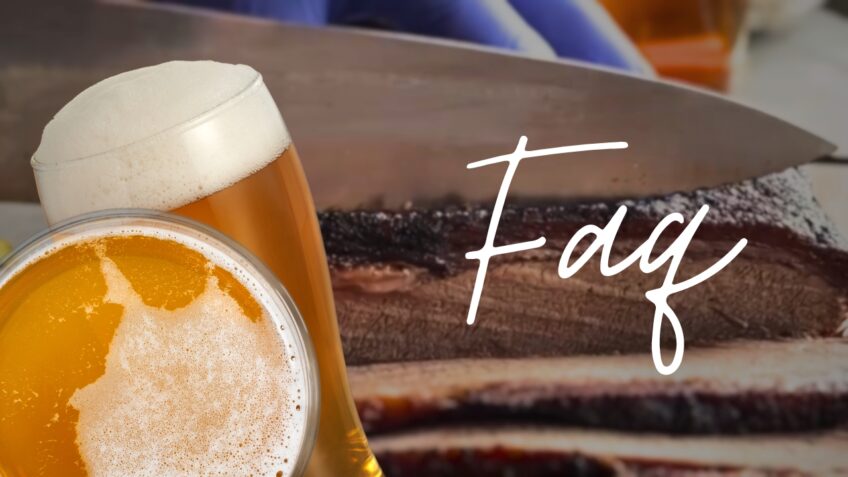
Can I pair beer with brisket?
Yes, beer can be a suitable alternative for pairing, with options like stout, porter, or IPA offering a range of flavors and intensities to complement various meat preparations. The choice of beer should be based on the flavor profile and intensity of the meat dish, as well as personal preference.
Are there any non-alcoholic options for pairing with brisket?
Non-alcoholic beverages like sparkling water, iced tea, or fruit-infused water can provide refreshing and palate-cleansing options for those who prefer not to consume alcohol. The choice of non-alcoholic beverage should complement the flavors of the meat dish and provide a pleasant contrast to the richness of the meat.
How do different cooking methods for brisket affect wine pairing?
Cooking methods like smoking, braising, or slow-cooking can significantly impact the flavor profile and texture of the meat, which in turn influences pairing. Smoked or heavily seasoned meat may require a full-bodied type with firm tannins, while braised or slow-cooked meat may be better suited for medium-bodied reds or even some full-bodied whites, depending on your taste.
How can I experiment with different wine pairings for brisket?
To explore different pairings, consider hosting a tasting event with friends or family. Prepare a variety of meat dishes using different cooking methods and seasonings, and provide a selection of varieties to sample alongside each dish. Encourage guests to share their thoughts and preferences, and use this feedback to refine your pairing choices.
Are there any “rules” for pairing wine with brisket?
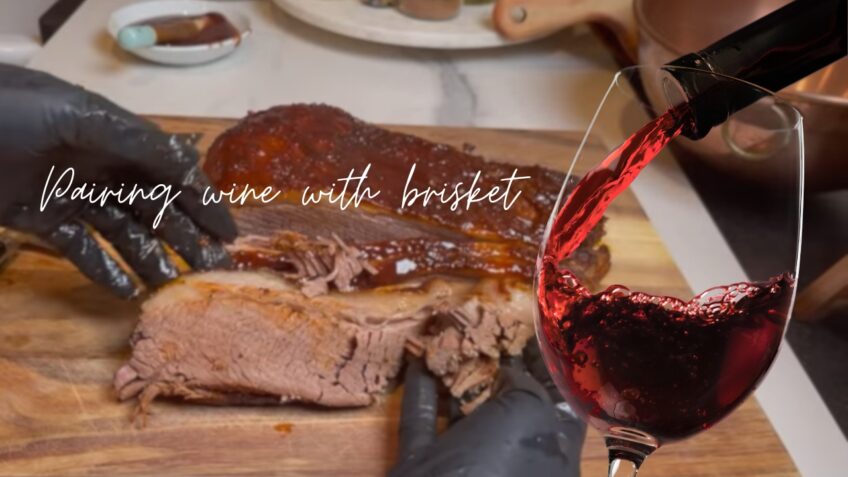
While there are guidelines and recommendations for pairing them, ultimately, the perfect pairing depends on your personal preference and the specific dish being served. Don’t be afraid to experiment with different varietals, and consider factors like acidity, tannins, body, and flavor profile when selecting it to complement your meat.
Conclusion
Pairing them can be a delightful and rewarding culinary adventure, transforming a delicious meal into an unforgettable dining experience. By considering the various factors that influence the harmony between them, such as the type and preparation of the brisket, the wine’s body, acidity, and tannins, and the impact of sauces and seasonings, you can make informed decisions when selecting the ideal wine to accompany your dish.
Don’t be afraid to experiment with different varietals, including red, white, rosé, and sparkling wines, as well as other alternatives like beer or non-alcoholic beverages. By understanding the nuances of brisket and wine pairing, you can impress your guests, enhance the flavors of your meal, and create lasting memories around the dining table. Remember to pay attention to serving temperature and glassware to ensure the best possible pairing experience.
Armed with the knowledge and tips presented in this article, you can confidently embark on your journey to discover the perfect meat and wine pairing, elevating your culinary prowess and delighting your taste buds along the way.

